

Myers-Briggs helps CIOs tap other sides of personalities. (Part two of a two-part series) Chief information officers, and IT professionals overall, are being taxed and challenged like never before.
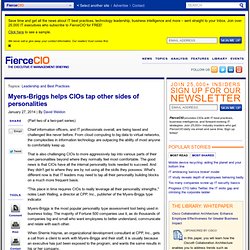
From cloud computing to big data to virtual networks, the complexities in information technology are outpacing the ability of most anyone to comfortably keep up. That is also challenging CIOs to more aggressively tap into various parts of their own personalities beyond where they normally feel most comfortable. The good news is that CIOs have all the internal personality tools needed to succeed. And they didn't get to where they are by not using all the skills they possess.
Sign up for our FREE newsletter for more news like this sent to your inbox! "This place in time requires CIOs to really leverage all their personality strengths," notes Leah Walling, a director at CPP, Inc., publisher of the Myers-Briggs type indicator. Myers-Briggs is the most popular personality type assessment tool being used in business today. A 16-room house.
Chrishoeller : #MBTI #cognitivefunctions... Dunning Personality Type Experts. By Donna Dunning Which 2 type letters are shared by almost half of the US population?
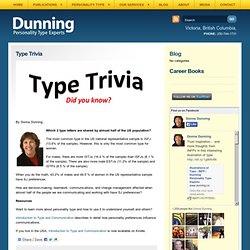
The most common type in the US national representative sample is ISFJ (13.6% of the sample). However, this is only the most common type for women. For males, there are more ISTJs (16.4 % of the sample) than ISFJs (8.1 % of the sample). There are also more male ESTJs (11.2% of the sample) and ISTPs (8.5 % of the sample). When you do the math, 43.2% of males and 49.5 % of women in the US representative sample have SJ preferences. How are decision-making, teamwork, communications, and change management affected when almost half of the people we are communicating and working with have SJ preferences? Resources. Career Choice, Personality Type, & the Inferior Function. By Dr.
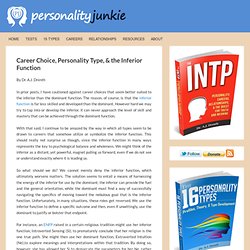
A.J. Drenth In prior posts, I have cautioned against career choices that seem better suited to the inferior than the dominant function. The reason, of course, is that the inferior function is far less skilled and developed than the dominant. However hard we may try to tap into or develop the inferior, it can never approach the level of skill and mastery that can be achieved through the dominant function. With that said, I continue to be amazed by the way in which all types seem to be drawn to careers that somehow utilize or symbolize the inferior function.
So what should we do? For instance, an ENFP raised in a certain religious tradition might use her inferior function, Introverted Sensing (Si), to prematurely conclude that her religion is the one true path. With regard to career choice, we cannot deny our attraction to careers that tie into our inferior function. With that said, being a Myers-Briggs Feeler in a Thinking-oriented field is not a hopeless situation.
Personalities influence workforce planning. What if factory foremen treated their workers less like the machines they operate, and more like people, with personality strengths and differences?
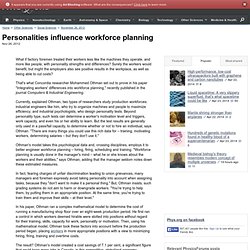
Surely the workers would benefit, but might the employers also see positive results in the workplace, as well as being able to cut costs? That's what Concordia researcher Mohammed Othman set out to prove in his paper "Integrating workers' differences into workforce planning," recently published in the journal Computers & Industrial Engineering. Currently, explained Othman, two types of researchers study production workforces: industrial engineers like him, who try to organize machines and people to maximize efficiency; and industrial psychologists, who design personality tests. Beyond personality type, such tests can determine a worker's motivation level and triggers, work capacity, and even his or her ability to learn. The result?
Beyond manufacturing, Othman says his model could also be applied to the service industry. Blogging for Your Personality Type. What kind of blogging is right for your personality type?
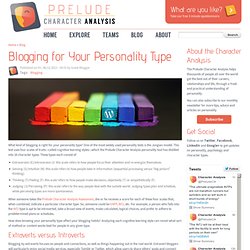
One of the most widely used personality tests is the Jungian model. This test uses four scales of traits—called cognitive learning styles—which the Prelude Character Analysis personality tool has distilled into 16 character types. These types each consist of Extraversion (E)/Introversion (I): this scale refers to how people focus their attention and re-energize themselves. Sensing (S)/Intuition (N): this scale refers to how people take in information (sequential processing versus “big picture” thinking). When someone takes the Prelude Character Analysis Assessment, she or he receives a score for each of these four scales that, when combined, indicate a particular character type. How does knowing your personality type affect your blogging habits? Extraverts versus Introverts.
Personality Types. Clifton StrengthsFinder. TypeLogic Home Page. Strengths Finder Strengths List. Personality types.
Myers Briggs.